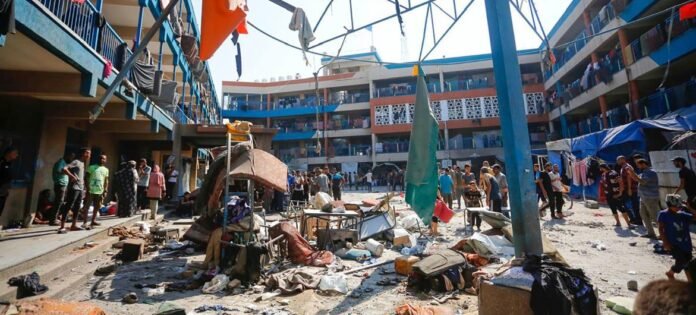Tragic Events in Gaza: A Deep Loss for the UN Community
The recent tragic events in Gaza have profound implications not only for the individuals involved but also for the broader humanitarian efforts led by the United Nations. The airstrikes that targeted UN guesthouses in Deir al Balah resulted in the heartbreaking loss of a dedicated UN staff member, while five others sustained serious injuries. This incident marks yet another chapter in the ongoing conflict that has inflected deep wounds on the civilian population, particularly those who serve in humanitarian capacities to assist the vulnerable.
The violence in Gaza emphasizes the escalating risks faced by UN personnel who operate in conflict zones. António Guterres, the UN Secretary-General, has expressed his profound sorrow over the tragic loss, framing it as an attack not only on individuals but on the essential principles of humanitarian assistance and protection. Guterres’s response underscores the moral obligation of all parties involved in the conflict to ensure the safety of humanitarian workers, who strive to alleviate suffering regardless of the circumstances. He highlighted that such acts of violence not only impede aid efforts but also exacerbate the humanitarian crises affecting the civilian populace.
The emotional ramifications of this tragedy ripple through the UN community, manifesting as grief and outrage over the conditions that have rendered humanitarian workers vulnerable. Each loss is not just statistic; it symbolizes the dedication and sacrifice of individuals committed to serving those in desperate need. This incident reiterates the urgent necessity for a renewed commitment to safeguarding humanitarian personnel, ensuring that they can carry out their vital role without fear of violence. As the UN navigates this tragedy, it calls on all stakeholders to uphold international norms surrounding the protection of non-combatants and humanitarians, aiming for accountability and justice amidst the chaos.
International Law and the Protection of UN Personnel
The protection of United Nations (UN) personnel during armed conflicts is enshrined in various international legal frameworks. Primarily, the principles laid out in the UN Charter and various international treaties, such as the Geneva Conventions, set forth obligations that require all parties involved in conflict to respect and protect UN personnel, facilities, and operations. This legal obligation not only underscores the importance of safeguarding humanitarian missions but also establishes a framework for accountability in the event of violations.
Parties to a conflict must ensure the safety and inviolability of UN premises, as stated in Article 24 of the UN Charter. This article articulates that member states have a responsibility to provide the necessary protection to UN agents and facilities, recognizing their crucial role in promoting and maintaining international peace and security. Furthermore, the Geneva Conventions, particularly Additional Protocols I and II, outline specific protections granted to humanitarian personnel, which include UN workers operating in conflict zones.
International humanitarian law emphasizes that attacks on individuals who are recognized as non-combatants, including UN personnel, constitute serious violations. Such acts are not only breaches of international law but also infringe upon basic human rights. The international community views these violations as grave offences, warranting complete accountability and potential legal repercussions for perpetrators. Consequently, these legal norms serve as a reminder that the safety of UN workers is not merely a matter of organizational policy, but a legally binding commitment upheld by global standards.
In essence, the obligations established under international law reflect a collective duty to uphold the principles of humanitarian protection and the rule of law. Any disregard for the safety of UN personnel undermines the essential work that these individuals perform and threatens the broader goals of peace and justice on an international scale.
A Call for Accountability and Protection: UN’s Stand
The recent attacks on United Nations personnel in Gaza have elicited a firm condemnation from the UN Secretary-General, underscoring the organization’s commitment to accountability and the protection of civilians. The Secretary-General has called for an immediate and thorough investigation into these violent incidents, emphasizing that those responsible for the assaults must be held accountable. This condemnation serves not only as a statement against violence but also as a deterrent to future attacks on humanitarian workers who operate in high-risk environments, such as conflict zones.
The UN has long been a proponent of adherence to international humanitarian laws, which are designed to protect both civilians and those engaged in humanitarian efforts. The attacks on UN personnel in Gaza threaten the very fabric of these principles, jeopardizing the safety of individuals dedicated to alleviating human suffering. The Secretary-General’s insistence on a full investigation is pivotal, signaling to the global community that negligence towards the safety of humanitarian workers will not be tolerated. Such accountability is critical in ensuring that the rule of law is upheld, and it serves to validate the risks that UN personnel undertake in their mission to provide assistance and support to vulnerable populations.
Furthermore, the UN continues its efforts to advocate for the protection of civilians in conflict zones, where breaches of humanitarian law can result in dire consequences. By highlighting these incidents, the Secretary-General aims to shine a light on the urgent need for all parties in conflict to respect the safety and dignity of humanitarian workers. The commitment to justice and accountability remains a cornerstone of the United Nations’ role, reinforcing its aim to foster peace and security around the globe. Immediate action in response to these attacks will not only protect UN personnel but will also strengthen the overall integrity of humanitarian efforts
Urgent Humanitarian Needs: The Interaction of Conflict and Aid
The humanitarian situation in Gaza has reached a critical point, exacerbated by the ongoing violence that has led to significant loss of life and widespread suffering among civilians. The persistent conflict has disrupted the delivery of essential services, resulting in urgent humanitarian needs that require immediate attention. With infrastructure severely damaged, access to clean water, medical care, and food supplies has diminished, leaving thousands of individuals vulnerable and at risk of further hardship.
This dire scenario underscores the necessity for a ceasefire to enable the unhindered provision of humanitarian assistance to those most affected. A cessation of hostilities would not only facilitate the immediate delivery of aid but also establish a more conducive environment for dialogue and potential resolution. Humanitarian organizations are calling for open access to Gaza to ensure that food, medical supplies, and other critical resources can reach those in dire need.
Furthermore, the release of hostages has become an urgent humanitarian imperative amid the ongoing conflict. The plight of these individuals and their families adds an additional layer of complexity to the already dire situation in Gaza. Their safe return is paramount, and concerted efforts must be taken to negotiate their release while respecting the principles of international humanitarian law.
The implications of the conflict extend beyond immediate humanitarian needs; they encompass a broader spectrum of emotional and psychological trauma that affects the civilian population. The United Nations remains steadfast in its commitment to upholding humanitarian principles, advocating for the protection of civilians, and ensuring that aid is delivered in a timely and impartial manner. Addressing these urgent needs requires a unified response from the international community, emphasizing the importance of cooperation and solidarity in the face of unrelenting adversity in Gaza.



I love it when people come together and share opinions, great blog, keep it up.